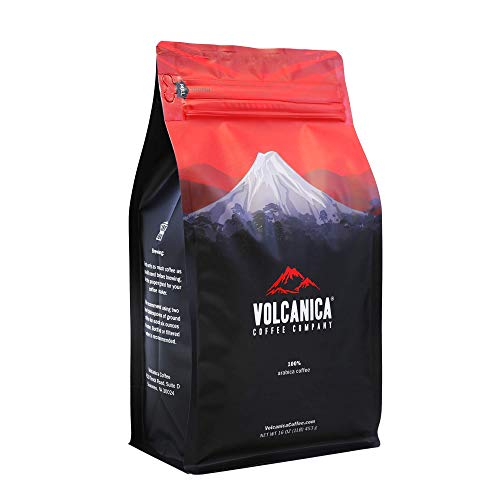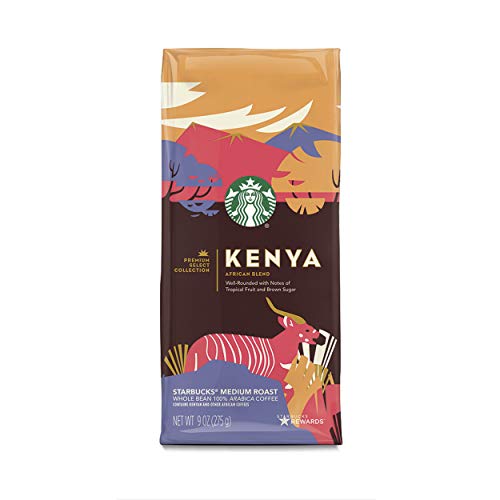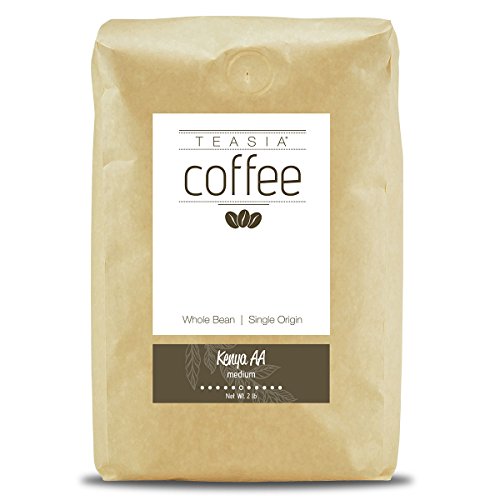We all do it eventually. We take a sip of delicious coffee and wonder: where did this come from? While there are several impressive coffee exporters across the globe, few are as unique and influential as Kenyan coffee.
At a Glance: Best Kenyan Coffee
Read on to find out why Kenyan coffee is one of the most enjoyed blends of coffee among coffee lovers around the world.

Quick Summary: Best Kenyan Coffee
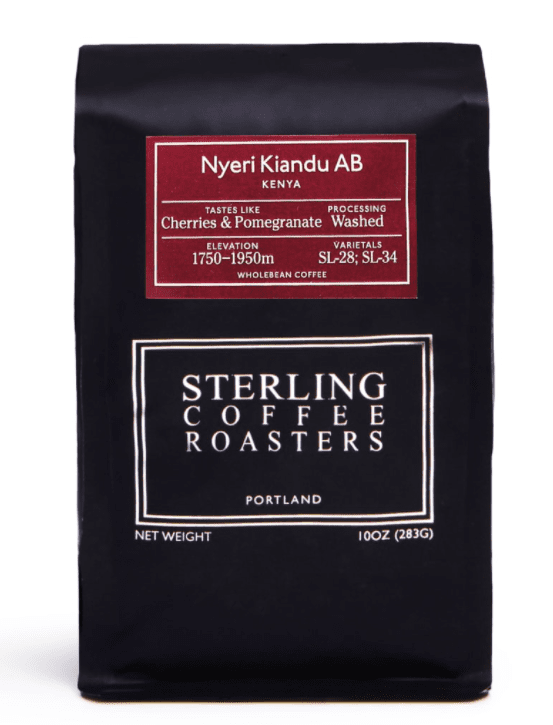 | Our Top Choice STERLING COFFEE ROASTERS NYERI KIANDU AB |
| Check Price → |
 | Volcanica Kenya AA Coffee Beans |
| Check on Amazon → |
 | Green Mountain: Kenyan Highlands K-Cups |
| Check on Amazon → |
 | Fresh Roasted Coffee: Kenya-AA |
| Check on Amazon → |
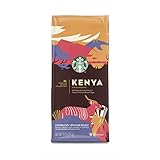 | Starbucks Kenyan Coffee |
| Check on Amazon → |
 | Screen 18 Kenyan AA Single Origin Coffee |
| Check on Amazon → |
 | Teasia Coffee Kenya-AA Whole Bean Coffee |
| Check on Amazon → |
 | Volcanica Coffee Peaberry Kenyan Coffee |
| Check on Amazon → |
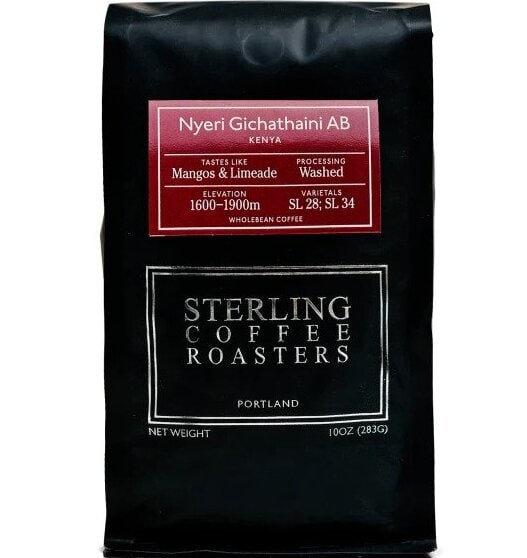 | Sterling Coffee Roasters - Kenya Nyeri Gichathaini AB |
| Check Price → |
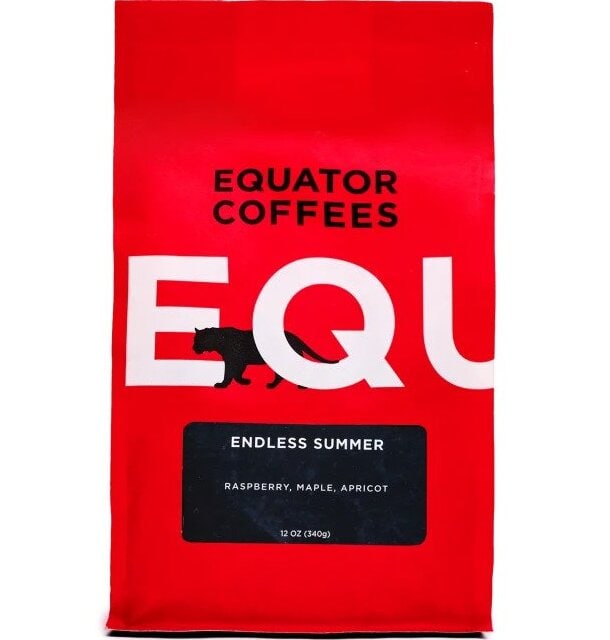 | EQUATOR COFFEE – ENDLESS SUMMER |
| Check Price → |
In the Beginning…
Though it’s close to Ethiopia, which is widely considered the birthplace of coffee, the plant was not introduced to Kenyan soil until the late 1800s.
Cultivation began in 1893 and created a new cash crop for a majority of local farmers and traders throughout the mountainous regions of the country.
According to history, coffee was first introduced to Kenya by French missionaries who were part of a group called the Holy Ghost Fathers. These missionaries brought coffee plants from Réunion Island off the coast of Africa.
Mission farms near the capital city of Nairobi became an important hub for the solidification of coffee production that would later spread throughout the country.
Kenyan Coffee Today
Nowadays, this little country is ranked as the 16th largest exporter of coffee in the world. Widely regarded as producing some of the most authentically flavored coffee beans on the market, Kenyan coffee beans have become a critical player in the coffee industry today.
Since its introduction, coffee farming has provided many jobs to local people almost everywhere. More than 150,000 farmers and 6 million workers are employed in the coffee industry.
In addition, another impressive fact is that 2/3 of all of the coffee that is exported comes from small-scale farmers, while only the remaining 1/3 comes from larger estates.
Not only has coffee benefitted Kenyan workers and farmers, but it’s helped the country overall as far as global exportation and trade.
Furthermore, with the sudden construction and development of farms and growing regions to support the growth of these plants, infrastructure in the nation has skyrocketed. Roads, villages, and cities have slowly been built around the success of the local and large-scale coffee industry.
Flavor Overview
Though there are some robusta beans that are grown in Kenya, most of the beans grown are arabica beans. Kenyan coffee is typically known for having a rich flavor. Usually, it has an acidity that’s similar to wine and has a very robust aroma.
In addition, many Kenyan coffee beans also have vivid and complex fruity flavors, as well as a full body that’s similar to many Ethiopian blends.
However, this is also just an overview of the general flavor you can expect from Kenyan beans as a whole. Depending on which region they come from, different Kenyan beans may have slightly different variations in flavor.
Coffee connoisseurs with a developed palate should easily be able to detect the differences between these different regional blends.
Kickin’ Kenyan Coffee Brands
Good Kenyan coffee has a distinct flavor to it. It’s typically well-balanced and medium-bodied, with a stronger, cleaner, more crisp flavor.
Lovers of Kenyan coffee often describe the aftertaste as a wine-like acidity or even a slight zest to it. You can experience this robust flavor by trying some of the delicious Kenyan coffees below.
Sterling Coffee Roasters Nyeri Kiandu AB

Sterling Coffee Roasters Nyeri Kiandu AB
Neon-bright and deeply sweet, here’s a great example of a Kenyan coffee. A complex citrusy aroma and acidity balance a deep, lingering pomegranate and dried cherry sweetness.
Neon-bright and deeply sweet, here’s a great example of a Kenyan coffee. A complex citrusy aroma and acidity balance a deep, lingering pomegranate and dried cherry sweetness.
If you’re new to the world of Kenyan coffee and are looking for something that really captures what this region’s joe is all about, we think this bag of beans from Sterling Coffee Roasters is a great place to start.
The Portland-based brand’s Nyeri Kiandu AB beans have the citrus aroma and wine-like acidity we mentioned earlier.
And even though the primary flavors are those of cherries and pomegranates, you may also notice hints of lime, mango, blackberry, black currant, and red grape popping up here and there. If you’re a fan of fruity sweetness, this coffee is right up your alley!
Volcanica Kenya AA Coffee Beans
Made of 100% arabica beans, Volcanica’s Kenya AA Coffee Beans are always grown over 3,000 feet, ensuring that each bean is packed with as much flavor as possible.
As its name implies, Volcanica grows all of its coffee in volcanic soil, Kenya being a particular area rich with soil that makes healthy coffee plants and succulent coffee beans.
This blend is robust, well-balanced, and is also easy on acidity. It has a wine-like aftertaste with tones of berries and citrus. Not only will it give you that caffeine kick to get your day going, but the delicious flavor will leave you craving a second cup.
Green Mountain: Kenyan Highlands K-Cups
Fan of Keurigs? These Kenyan Highland K-Cups by Green Mountain will give you a flavorful cup of Kenyan coffee in a matter of a few minutes. This is a medium roast, with wine-like acidity and a fruity, blackberry finish.
These beans are grown and cultivated off the shore of Lake Victoria. The fertile climate here helps grow beans that are healthy and packed with flavor. Furthermore, not only do these beans taste delicious, but they’re also Fair Trade Certified.
Fresh Roasted Coffee: Kenya-AA
A medium-dark roast, this blend by Fresh Roasted Coffee is guaranteed to be packed with flavor. It is well-bodied and has hints of peach, orange, and black tea.
Coming from the Nyeri region of Kenya, these beans are grown in the southwestern region of the country, grown in fertile and volcanic soil.
These beans are grown on small-scale local farms, ensuring that the beans are thoroughly cultivated and selected to make the best roast possible. Fresh Roasted also offers different-sized bags: 12 ounces, 2 pounds, and 5 pounds.
This gives you the option to either purchase a small serving if you want to just test it out, or if you’d rather buy in bulk.
Starbucks Kenyan Coffee
This whole bean roast by Starbucks is among the most savory this company sells. A well-balanced, well-rounded roast, this African blend has notes of tropical fruit and hints of brown sugar.
Grown in the mountainous regions of Kenya, these beans are grown in high elevations and are packed with flavor as a result.
Each bag is packaged right after roasting is complete to preserve the quality of the beans. Furthermore, since this Kenyan blend is also packaged as whole bean, you can grind the beans on your own which aids in preserving both flavor and freshness as well.
Screen 18 Kenyan AA Single Origin Coffee
Coming in both whole beans and grounds, these AA beans are some of the highest quality beans not only in the Kenyan coffee market but on a global scale as well.
Grown at elevations higher than 6,600 feet, they’re packed with a deep fruity/berry flavor. This blend has a wine-like acidity and is full-bodied with a pleasant aroma.
Screen 18 roasts every batch in small amounts to bring out as much flavor in the beans as possible. Roasting in small batches also helps to ensure the freshness and quality of the beans, giving you the most delicious cup of coffee possible.
Teasia Coffee Kenya-AA Whole Bean Coffee
Grown in volcanic soils at high elevations, Teasia’s Kenya AA beans are considered to be some of the most savory coffee beans on the market today. Teasia makes sure that their beans are grown in the richest soil possible.
In addition, they also wait until their plants are mature to harvest rich, flavorful beans.
Roasting their beans in small batches, Teasia uses the most advanced and environmentally friendly technology available.
Investing time, patience, and hard work into their growing and roasting process, each step is heavily involved in giving you the best beans possible.
Volcanica Coffee Peaberry Kenyan Coffee
Peaberry coffee by itself is one of the rarest and most delicious coffees available on the market. Therefore, these peaberries that Volcanica grows in rich Kenyan soil are even more robust. With a light acidity, it’s easy to sip and refreshing to start your day with.
Possessing hints of floral and citrus, these beans are full-bodied and provide both a rich flavor and a strong, sweet aroma. This blend is a medium roast, with a balanced amount of caffeine, and has a full body.
Sterling Coffee Roasters – Kenya Nyeri Gichathaini AB
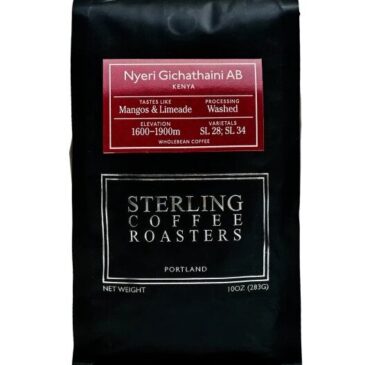
Sterling Coffee Roasters - Kenya Nyeri Gichathaini AB
Huge lime acidity, tons of syrupy blackberry and pomegranate sweetness, and a rich body to balance everything out – this is everything we love about Kenyan coffees.
Roasted by Sterling in Portland, OR, this light-medium roast is described as “HUGE!” by its roasters. Huge flavor, huge quality, huge love!
With lime-like acidity, that’s counterbalanced by the sweetness of blackberry syrup and pomegranate, this bold roast does not disappoint.
With a rich and balanced body, you will note both the sweet and tart aspects of this roast coming across in flavors like tropical fruit, mango, berry fruit, limeade, and even watermelon jolly rancher.
Grown at an elevation between 1,600 and 1,900 and in a wet, mineral-rich environment on Mt. Kenya, these beans come from one of the most coveted coffee-growing regionsin the world.
Before roasting, these beans go through a washed process to help bring out all those flavors while still maintaining their lime acidity level.
Equator Coffee – Endless Summer
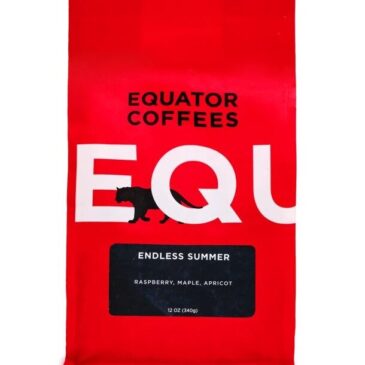
Equator Coffee – Endless Summer
Seasonally evolving, yet consistently deliciously balanced. This iteration is delicate and floral, with honeysuckle aromatics and a gentle nectarine sweetness.
Based out of San Rafael, CA, Equator is a roasting company that is female-founded and led and takes pride in roasting as sustainability and responsibly as possible.
Although not a single-origin coffee, Endless Summer takes beans from Kenyan and Ethiopian regions to create a delicious light roast blend.
This roast creates a vibrant and complex brew that smells like honeysuckle but gives you delicate-tasting notes of citrus, orange blossom, white peach, and milk chocolate. The fruity flavors come out boldly in a cold brew, earning this blend its name of “Endless Summer.”
Grown at altitudes of 5,350-7,380 and then processed through washing, Endless Summer is best brewed in a filter/drip or cold brew method to best bring out its fruity elements.
Kuma – Sun Bear
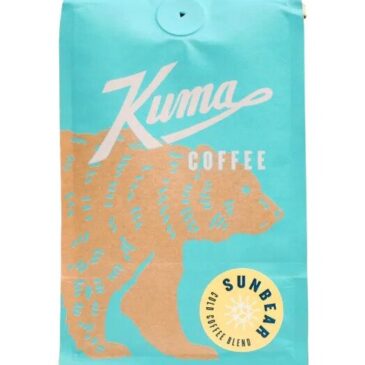
Kuma – Sun Bear
It’s always cold brew season. Brew this coffee cold for a smooth, chocolatey cup, or straight onto ice to highlight its berry sweetness.
A delightful summer blend of Central American and Kenyan-grown beans, Kuma roasts “Sun Bear” to the perfect light-medium roast that makes an excellent cold brew.
With tasting notes that range from chocolatey to berries to floral, this sweet blend will have you smacking your lips and enjoying the full-bodied flavors.
Grown and cultivated at a 1,600 ft elevation and then processed through a washing method, Sun Bear is then roasted by Kuma, a coffee roasting company based in Seattle, Washington.
Kuma prides itself on its equitable sourcing structure where they purchase directly from coffee farmers and pay above fair trade prices to ensure farmers are making a livable wage.
Feast – Nguku
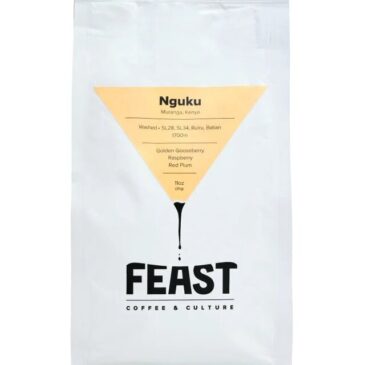
Feast – Nguku
This coffee from the Murang’a region features the classic Kenyan combination of crisp lime acidity and dense blackcurrant sweetness, as well as some fragrant cedarwood aromatics.
Originating from the Murang’a region in Kenya, these beans give the perfect classic Kenyan coffee taste. Your tastebuds will first experience the tart lime acidity upfront but then be greeted with the sweeter, mellower tones of berry and plum.
Roasted to a medium roast, Redding, CA, Feast prides itself in creating quality coffee that best reflects the origin of the coffee.
This is what makes their Nguku roast a quality Kenyan coffee to try as it reflects the aspects of Kenyan coffee that we love so much.
Sparrow – Kenya Thiriku AB
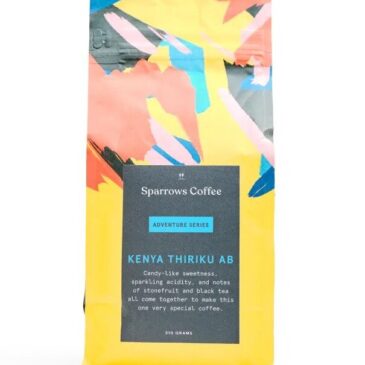
Sparrow - Kenya Thiriku AB
Dense and sticky notes of tamarind meet a bounty of lime aromatics and candy-like vanilla sweetness in this clean and juicy cup.
Coming from the Nyeri region in Kenya and being grown at an elevation of 1,880-1,970 ft, Sparrow has perfected their craft of roasting these sweet beans to a perfect medium roast that best pulls out the unique elements of the beans.
Whether brewed in a pour-over method or in a drip fashion, you’ll taste notes of caramel, peach, and black tea and enjoy a buttery finish that rounds out this perfect roast.
Sparrow ensures that farmers and workers are being paid fair wages for their skills in cultivating and processing these quality coffee varieties.
This care, respect, and professionalism really make a difference in your coffee quality as you know that your morning jo is being equitably sourced, but also because Sparrow continues to have the same approach throughout their roasting and packaging processes.
When you get a bag of beans that you know have been well cultivated, grown, and cared for, those flavors, aromas, and rush of caffeine are just that much better.
Kenya Thiriku is a fantastic roast to enjoy in any form and gives you a delicious expression of the quality coffee that Kenya is distributing across the globe.
Panther – Ichamama
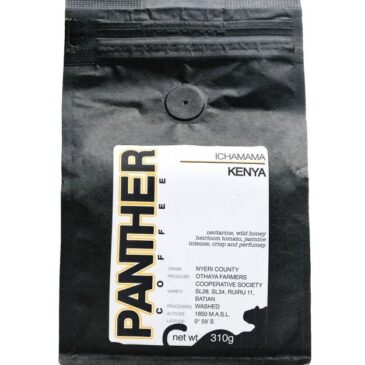
Panther – Ichamama
Lasting syrupy raspberry notes and a sweet-tart combination that reminds us of sour lime candies are complemented by slightly savory herbaceous notes lingering in the background.
Panther has managed to bring a delicious, savory, complex medium roast that honors the traditional Kenyan coffee tastes that it originates from.
Grown at an elevation of 1,850 ft and then processed through washing methods, this bold brew will give you savory tasting notes such as heirloom tomato and jasmine intense while still delivering floral and fruity undertones.
All of these elements come through to create a dynamic and intense brew that can be enjoyed in many forms, whether iced, pour-over, or drip coffee.
Factors That Affect Coffee Growth
Several factors affect the growth of coffee and the flavors of the beans. Depending on how intense or severe these growing conditions are, coffee beans can either be very dull in flavor or very rich.
The main conditions that play a part in the growth of the beans are elevation, rainfall, sun exposure, and processing method.
Elevation
The higher in elevation coffee beans are planted, the harsher the conditions they will experience. As a result, crops that are planted here have to fight more to survive, grow, and thrive.
This “fight” allows the plants to create more nutrients and acids that contribute more to the flavor of the coffee beans.
So, most Kenyan beans are grown around 4,500-6,500 feet in elevation. Farmers plant the crops at this elevation to ensure that they must struggle more to grow, creating the richest flavor possible.
Since the elevation is so high, some beans that are cultivated in Kenya can be classified as SHG (Strictly High Grown) and/or SHB (Strictly Hard Bean).
Rainfall
Understandably, for plants to grow, they must receive water. However, elevation and rainfall tend to go hand-in-hand when it comes to influencing coffee growth.
In mountainous regions, elevation influences precipitation significantly. The fluctuation of warm and cool winds colliding in mountainous regions, encourages precipitation to increase.
Sun Exposure
Kenya is right along the Earth’s equator, giving it a normally warmer climate. It receives a steady amount of sunshine and has annual temperatures between 68-82 degrees Fahrenheit.
Due to its direct location on the Equator, Kenya doesn’t experience that severe of a summer or winter season. Since it has somewhat stable sunlight and temperatures, coffee is very easily grown here.
Soil Quality
Kenya resides on an abundance of volcanic soil. This soil is enriched with vitamins and minerals that not only help coffee plants grow and thrive, but it enhances the flavor of the beans due to the abundance of nutrients.
Processing Method
Most Kenyan coffees are green coffee that is processed using the wet or washed method. Since this is one of the most common coffee processing methods, it’s widely used throughout many Kenyan coffee farms.
The wet process illuminates the individual flavors and notes within the beans since it helps to highlight them through fermentation.
Grading Kenyan Beans
Different areas in Kenya produce different kinds and different-sized beans. As a result of this, Kenya has a grading scale to help distinguish between the variety of beans it produces.
The method behind this grading is that groups of beans that are bigger, thicker, denser, and overall healthier-looking are going to make you a more delicious and fresh cup of coffee. This is why grading is taken so seriously in the coffee community.
Beans vary in size, one common measurement being “screens.” Ranging from 8 to 20, the screening scale helps mark how big the beans are in diameter. The number tells how many 64ths of an inch the holes in the beans are.
For example, 10 screen beans have holes that are 10/64 inch wide, and 15 screens have holes that are 15/64 inch wide.
The beans that are considered the most flavorful range from E beans to AB beans, these beans containing screens of 16 and above. This range of beans is normally considered to be healthier in makeup and is overall more vibrant in flavor.
Grades that are below a C bean may still make a decent cup of coffee, but the chances of decency decrease the lower the grade.
Here is a list of the different coffee grades from the best to the worst. Higher-grade coffees are healthier, while lower-grade coffees are normally deformed, mutated, and of lower quality overall.
The grades from best quality screen to lowest quality screen are: Kenya E (20), Kenya PB (19), Kenya AA (18), Kenya AB (17), Kenya C (16), Kenya TT, and Kenya T. Grades that are C or higher are normally suitable for export.
Kenyan Coffee Growing Regions
Several coffee-growing regions in Kenya produce large amounts of coffee beans each year.
Depending on where different beans are grown, factors like how strong the sunlight is in the morning vs the evening will impact a slight variation in flavors amongst the beans. Here is a quick introduction to these different areas.
Mt. Kenya
Located in the mountainous region of Kenya, found almost directly in the middle of the country, is one of the most well-known plateaus for growing coffee.
It has a steady elevation of approximately 4,500 feet, while the mountain itself is about 17,000 feet tall. Coffee grown here thrives due to its surrounding rocky, mineral-enriched soil.
Aberdare Range
In the southwestern area of the country, Aberdare Range is a high plateau region spanning about 100 miles wide. Just south of the Equator, this area has some of the most stable climate/temperatures that make it perfect for cultivating coffee.
The ecosystem here consists of over 700 plant species, composing a rainforest landscape that is fertile and loaded with all the nutrients coffee plants need to thrive.
Kisii
Kisii is a smaller county in southwestern Kenya. Located about 40-50 miles from Lake Victoria, the fourth largest lake in the world, the soil here is very moist and lush. This makes it another ideal area to cultivate coffee.
Nyanza
Nyanza Province is the Bantu word meaning “water,” which summarizes pretty much everything about the landscape of the region.
Positioned almost right along the eastern shore of Lake Victoria, Nyanza has a thriving ecosystem that makes it an ideal area to farm coffee plants.
Bungoma
Bungoma is primarily known as an agricultural area located in the western part of the country. The area is known for cultivating sugar, maize, and of course, coffee.
With a population of over 50,000 people, the area is full of workers who use the land to produce some of the most delicious coffee beans on the market.
Nakuru
The fourth-largest city after the country’s capital, Nairobi, Nakuru is also positioned in the southwestern part of Kenya.
With a temperature range of an average low of 50 degrees F and a high of 78 degrees F, the consistent climate makes it stable to grow coffee plants in large amounts. Typically known as a Mediterranean climate, the area commonly experiences a “cool summer” of sorts.
How to Brew Kenyan Beans
To unlock many of the hidden flavors inside the Kenyan beans, one method of brewing that’s best is steeping. This immersion process helps ensure that you’re able to extract as much flavor as possible without over-extracting.
Many baristas will brew Kenyan coffee through the French press, pour-over, and cold brewing methods.
Traditional Kenyan Coffee
Historically, Kenya is originally more of a tea-drinking nation as a whole. Since coffee hasn’t been on the scene for that long, many locals find themselves still getting acquainted with the drink.
However, there is a traditional style of consuming Kenyan coffee that has become a classic drink over the last several years.
One of the most common ways to prepare coffee is known as Kahawa Chungu, also known as “Bitter Coffee.” Considered a Kenyan delicacy, the stereotype of this drink is that it is normally enjoyed and favored by older Kenyan men.
This favor can be attributed to the belief among many that Kahawa Chungu is an aphrodisiac.
Where flavor is concerned, Kahawa Chungu is a spicy black coffee that’s brewed over a charcoal burner using a long-necked brass kettle. Kahawa Chungu is normally brewed at home or in the local marketplace.
Opposite the Kahawa Chungu is the Kahawa Tamu, which is a sweeter coffee drink. Kahawa Tamu is lighter in color than Kahawa Chungu and is less concentrated.
Baristas normally brew with optional ingredients like cinnamon, sugar, cloves, and cardamom. Moreover, dedicated coffee lovers will brew these drinks in the marketplace and in their home.
Locals enjoy drinking coffee in Kenya, but coffee consumption as a whole has not taken off on a large-scale basis in the country. It is mainly enjoyed in the coastal region, and you’re unlikely to find commercial coffee shops. There are currently only a handful of them in the nation, the first one being built fairly recently in 1999.
To Sum It All Up
At the end of the day, if you’re a genuine coffee lover, then Kenyan coffee should be on your must-try list.
With an impressive coffee-cultivating culture, Kenya not only stands out in global coffee exports but is globally recognized for its quality as well. So do some research, experiment, and try out a few!
Happy Сaffeinating!

